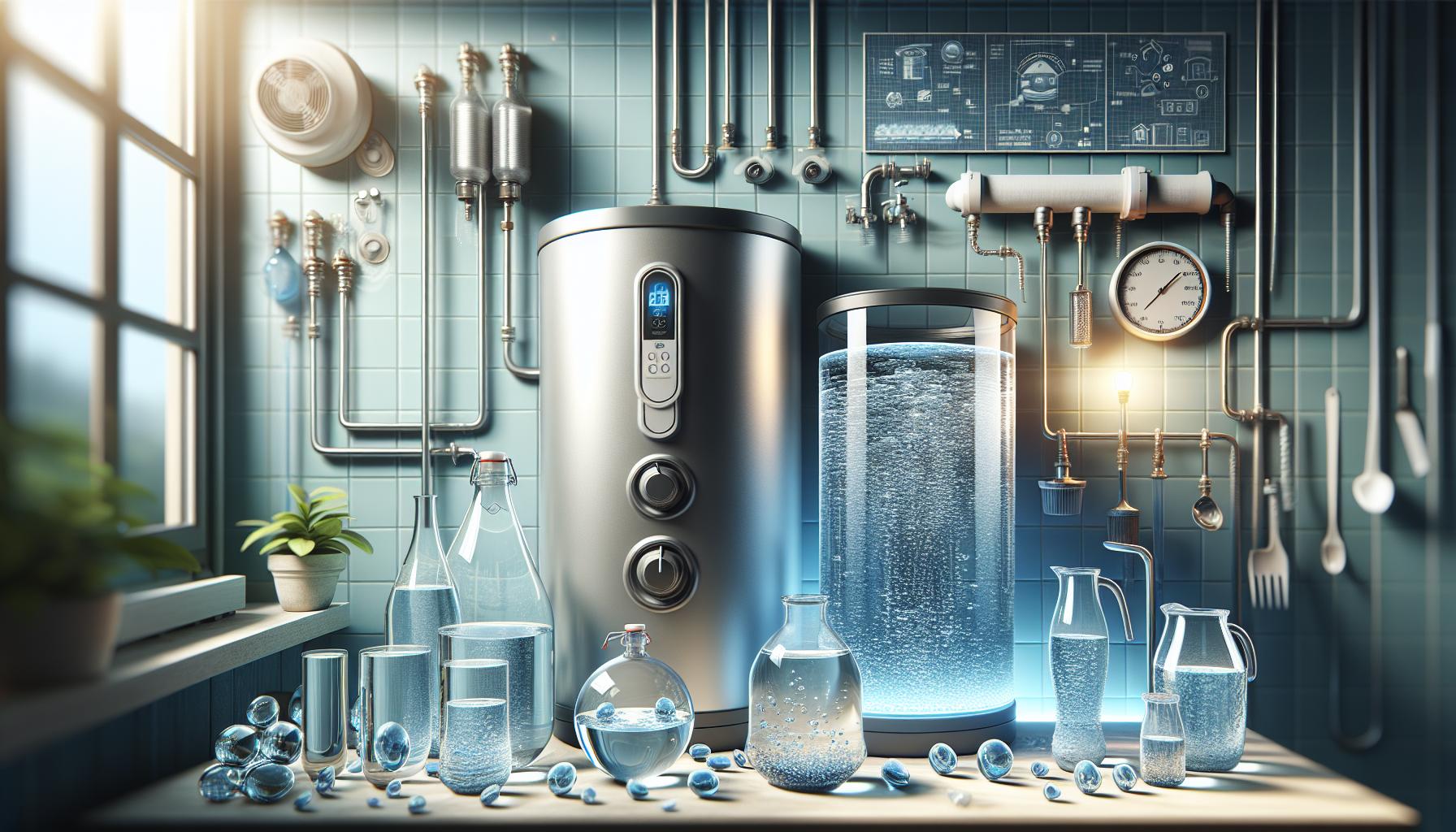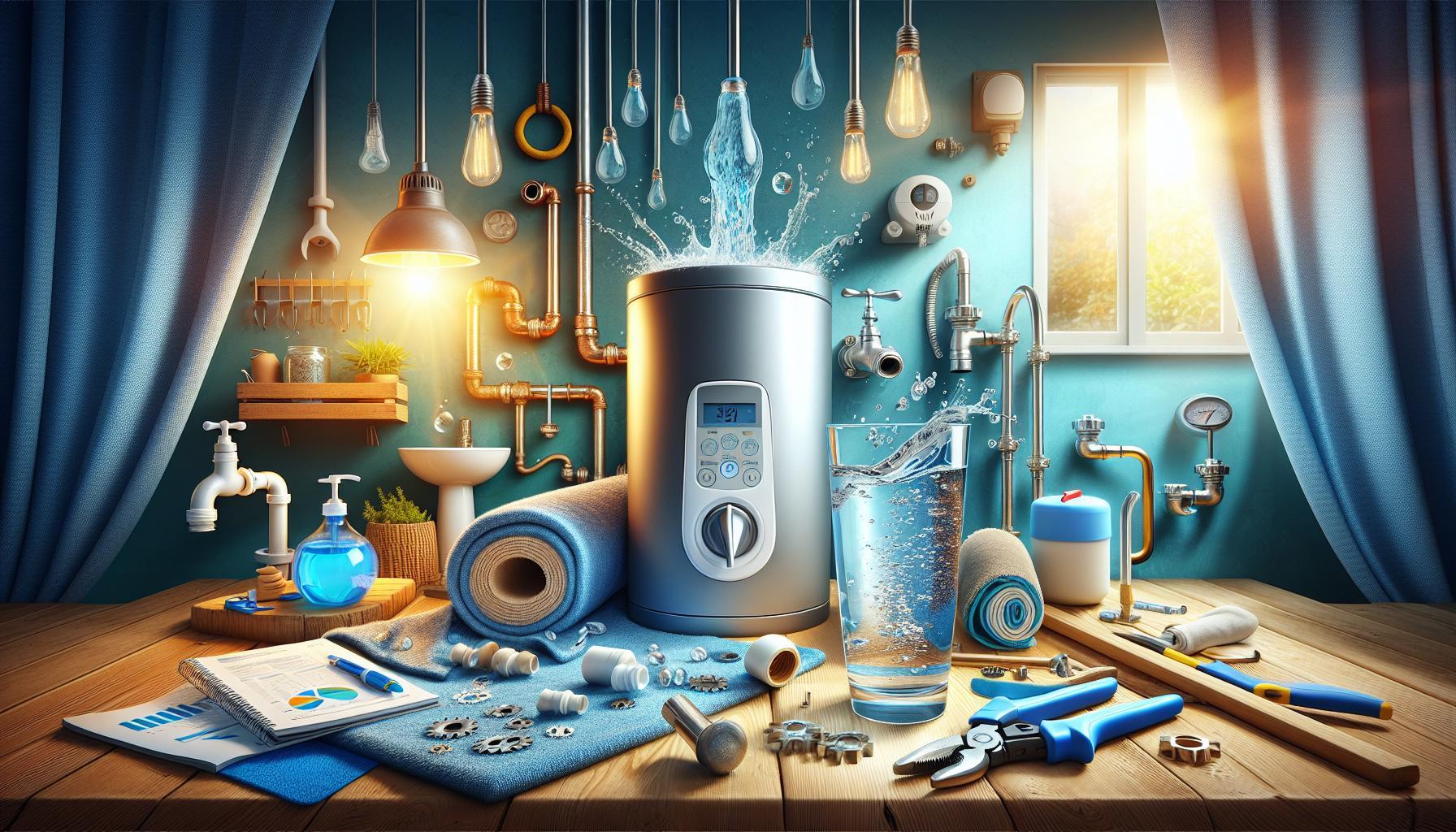Is your hot water smelling like rotten eggs? This unpleasant odor, often caused by bacteria and the anode rod in your water heater, can disrupt daily routines and indicate underlying issues. Understanding the source of these odors is crucial for maintaining a healthy home, and effective solutions can help you restore fresh-smelling water for good.
Common Causes of Water Heater Odors You Should Know
When hot water heaters emit unpleasant odors, it can quickly become a nuisance and signal underlying issues that need addressing. One of the most common smells is a sulfur-like odor, often described as a rotten egg scent. This bothersome smell typically arises from a combination of sediment buildup, bacterial growth, or problems with the anode rod within the heater. Understanding these causes can empower homeowners to tackle the problem head-on and enjoy fresher water.
Identifying the Key Culprits
The following are prevalent factors contributing to water heater odors:
- Sediment Buildup: Over time, minerals and sediment can accumulate at the bottom of the tank, particularly in areas with hard water. This accumulation can harbor bacteria and lead to foul odors. Regularly flushing the tank helps mitigate this issue.
- Bacterial Growth: In many cases, sulfate-reducing bacteria thrive in the sediment, producing hydrogen sulfide gas responsible for the rotten egg smell. These bacteria can flourish in environments where there is a lack of chlorine or where the water has been stagnant for too long.
- Deteriorating Anode Rod: The anode rod is a sacrificial component designed to prevent tank corrosion. When this rod deteriorates, it can react with sulfate in the water, producing unpleasant smells. Replacing it with a magnesium or aluminum rod can help reduce odors.
Additional Factors to Consider
While the above causes are the most common, there are other contributing factors that might exacerbate water heater smells:
- Rust and Corrosion: A rusted tank or plumbing components can also generate foul odors. Checking for signs of corrosion can indicate the need for repairs or replacement.
- Temperature Settings: Lower temperatures can encourage bacterial growth. Keeping the water heater set at a minimum of 140°F may reduce the risk of bacteria developing.
Actionable Solutions
If you find yourself asking, “Why does my water heater smell?” it’s time to take action. Start by conducting a thorough flush of your hot water heater to remove sediment and bacteria. Consider replacing the anode rod if it’s corroded, and routinely check for signs of rust or corrosion in both the tank and connected pipes. These proactive steps can significantly enhance your home’s water quality and eliminate odor for good.
How to Identify the Source of the Smell
When faced with an unpleasant smell from your water heater, it’s crucial to identify the source to determine the right course of action. Different odors can signal various issues, and by honing in on the scent’s characteristics, you can better understand what may be wrong. For example, if you detect a sulfur or rotten egg smell emanating from the water heater, this typically indicates the presence of hydrogen sulfide gas, often produced by bacterial growth in the tank or hot water supply. Conversely, a burning odor might suggest dust accumulation or, more severely, electrical issues or problems within the gas supply for gas-powered units.
Identifying Specific Odors
Start by categorizing the smell you perceive. Here are some common sources of odors related to water heaters:
- Gas Smell: A slight gas smell could emanate from the water heater valve. While this might not always indicate a serious problem, it’s essential to take immediate action and ensure that there are no leaks.
- Burning Smell: This may be attributed to dust buildup on heating elements or electrical parts. If the odor escalates or persists, turning off the unit is paramount—follow up with professional assistance to evaluate electrical safety.
- Sulfur Odor: Recognizable as a “rotten egg” smell, this can often originate from bacteria in the water. It can be treated by flushing the tank and potentially using bleach to eliminate bacterial growth.
Determining the precise cause of the smell involves a careful inspection of both the heater and its surroundings. Ensure that all connections are tight and that the area around the heater is well-ventilated. If a gas odor is detected, evacuate the area immediately and contact your gas provider. For deeper investigations, you may need to check the anode rod condition; a corroded anode rod can also produce foul smells in your water. Regular maintenance, including flushing the tank periodically, can help prevent these issues and ensure that you won’t find yourself asking, “Why does my water heater smell?”
Taking time to understand your water heater’s odors not only aids in resolving these issues effectively but also extends the life of the unit. With proper identification of the source, you can take the right steps to eliminate odors for good.
Simple Solutions to Freshen Up Your Water Heater
One of the most commonly encountered nuisances in households is a smelly water heater, which can significantly impact your comfort and hygiene. The good news is that there are straightforward solutions to freshen up your water heater and eliminate unpleasant odors once and for all. Most often, these odors stem from issues such as a deteriorating anode rod or sediment buildup in the tank, leading to scenarios where you’re greeted by the smell of rotten eggs whenever you turn on the hot water.
Flushing the Tank
A primary cause of foul odors is sediment buildup, particularly in water heaters that haven’t been maintained regularly. Over time, minerals and debris can accumulate at the bottom, and this can result in unwanted smells. To combat this, flushing your water heater is an effective solution. Here’s how to do it:
- Turn off the water heater (and gas supply if it’s a gas heater) to avoid any accidents.
- Connect a garden hose to the drain valve at the bottom of the tank.
- Direct the other end of the hose into a drain or outside.
- Open the valve and allow the water to flow out until it runs clear.
- Close the valve, remove the hose, and refill the tank by turning on the cold water supply.
This process helps remove built-up sediment that can harbor bacteria or create unpleasant smells.
Replacing the Anode Rod
Another key solution involves the anode rod, which is crucial for preventing tank corrosion. As the anode rod deteriorates, it can create hydrogen sulfide gas that imparts a rotten egg smell to your hot water. Checking and replacing the anode rod every 2-5 years can effectively tackle this issue. The process involves:
- Shutting off the water heater.
- Draining some water to relieve pressure.
- Unscrewing the anode rod from the top of the heater (it may require a wrench).
- Replacements can be found at hardware stores; screw in the new rod appropriately.
This simple maintenance task can significantly improve the smell of your hot water.
Regular Maintenance Checks
Incorporating regular maintenance checks can be pivotal in preventing foul odors. Here are some additional practices to maintain a fresh-smelling water heater:
- Schedule annual professional inspections to ensure everything is functioning optimally.
- Consider installing a water softener if hard water is prevalent in your area, as this can minimize sediment buildup.
- Consult an expert if there are persistent odors to rule out more serious plumbing problems.
By putting these solutions into practice, you can effectively answer the question, “Why does my water heater smell?” and take tangible steps to ensure your water remains clean and odor-free.
The Role of Bacteria in Water Heater Odors
The presence of odors in your hot water supply can often be traced back to bacterial growth, a common yet frequently underestimated issue. Bacteria thrive in the warm, stagnant environment of a water heater, especially when temperatures are set too low. This growth can lead to the production of foul-smelling gases, such as hydrogen sulfide, which is notorious for its distinct rotten egg odor. Understanding how bacteria contribute to water heater smells is crucial for maintaining a clean and odor-free hot water system.
How Bacteria Develop in Water Heaters
Several factors can promote bacterial growth in water heaters:
- Warm Water Temperatures: Bacteria favor temperatures between 77°F and 120°F, making water heaters an ideal breeding ground if the temperature is not adequately adjusted.
- Stagnant Water: Water that sits unused for extended periods can allow bacteria to multiply. This is especially common in households with low hot water usage.
- Poor Maintenance: Sediments and minerals that accumulate at the tank’s bottom can provide an environment for bacteria, leading to odors. Regular flushing of the tank can help mitigate this issue.
Bacteria not only cause unpleasant odors but may also pose health risks. As the bacteria proliferate, they can produce biofilms, which are sludgy coatings that may lead to blockages or further complicate cleaning efforts. Regular maintenance, including routine temperature checks and water heater flushing, can significantly reduce the risk of bacteria thriving in your system.
Preventative Measures
To combat these odor issues effectively:
- Increase Water Temperature: Set the thermostat on your water heater to at least 140°F to discourage bacterial growth.
- Regular Maintenance: Flush the tank at least once a year to remove accumulated sediment and minerals.
- Install a Powered Anode Rod: Consider upgrading to a powered anode rod, which can minimize corrosion and significantly reduce the chances of odors forming within the tank [[1]].
By understanding the role bacteria play in water heater odors, you can take proactive steps to ensure your hot water system remains clean, fresh, and safe. Maintaining your water heater not only helps eliminate unpleasant smells but also improves efficiency and extends its lifespan. Implement these practices regularly to enjoy consistent quality in your hot water supply.
When to Call a Professional for Water Heater Smells
When encountering unusual smells from your water heater, knowing when to seek professional help can save you time and prevent potential hazards. While some odors may stem from minor issues that homeowners can address, certain symptoms indicate that a technician’s expertise is necessary. Ignoring these signs can lead to exacerbated problems, safety risks, and costly repairs down the line.
Recognizing Critical Signs
It’s essential to identify specific symptoms that signal a professional should be contacted without delay. If you detect a burning smell, especially one resembling electric components, you must turn off the power to the water heater immediately. This odor often indicates overheating of the heating elements or potential electrical malfunctions, both of which can pose serious safety hazards. Electrical problems are prevalent in electric units and should never be overlooked [1[1].
For gas water heaters, a persistent burning odor may suggest issues with the gas supply or the combustion process. This can include problems with the pilot light or burner malfunctions. Furthermore, if you sense a gas smell that doesn’t dissipate, even in the absence of a leak, it’s crucial to contact a professional to assess the situation. Mismanaged gas issues can lead to dangerous situations, including fire risks or gas poisoning [3[3].
When DIY Fixes Aren’t Enough
While minor smells might be related to benign causes, such as dust accumulation or sediment buildup, these should only be attempted as DIY fixes if you are confident and knowledgeable about how to proceed safely. If you notice smells associated with melting plastic components or any unusual changes in performance—such as unusual noises, visible leaks, or fluctuating temperatures—opt for professional assistance. These signs often indicate deeper issues that require specialized tools and expertise to diagnose correctly.
It’s vital to differentiate between odors that can be addressed with simple maintenance and those indicative of potential catastrophic failures. Engaging a professional ensures that the repair is handled aptly and minimizes the risk of future complications. Relying on expert judgment not only resolves immediate issues but also provides guidance on regular maintenance to prevent future smells and enhance the longevity of your water heater system.
Preventive Measures for a Odor-Free Water Heater
Water heaters can sometimes emit unpleasant odors that disrupt the comfort of your home. However, a few proactive measures can ensure that your system runs smoothly and keeps odors at bay. Regular maintenance and thoughtful practices not only enhance the longevity of your water heater but also significantly reduce the chances of encountering foul smells.
Regular Maintenance Checks
Routine inspections of your water heater are vital. Start by flushing the tank periodically to eliminate sediment buildup, which can contribute to odors. This process typically involves:
- Turning off the power supply or gas to the unit.
- Connecting a garden hose to the drain valve and directing it to a suitable drain.
- Opening the drain valve to allow sediment and buildup to exit the tank.
- Flushing with fresh water until it runs clear, then closing the valve and removing the hose.
Scheduling a professional annual inspection can further enhance efficiency and catch potential issues before they develop into larger problems.
Water Heater Temperature Settings
Adjusting the temperature of your water heater can also combat unpleasant odors. Keeping your heater set at 120°F (49°C) not only prevents scalding but inhibits the growth of bacteria that can thrive at higher temperatures. Additionally, consider checking the temperature regularly to ensure it hasn’t inadvertently changed over time.
Using Anode Rods
The anode rod is essential in combatting corrosion within your water heater. If your water smells like rotten eggs, this may indicate a reaction between the anode rod and sulfate bacteria. Consider upgrading to a more suitable anode rod, such as one made of aluminum or zinc, which can minimize this reaction and extend the lifespan of your heater.
Water Quality Testing
Understanding the source of your water can be critical. Regular water quality testing can help identify contaminants that might contribute to odor formation. Should you discover elevated levels of hydrogen sulfide or other minerals, consider installing a water filtration system. This not only improves water quality but can also prevent microbial growth responsible for unpleasant smells.
By implementing these preventive measures, homeowners can maintain an odor-free environment while maximizing the efficiency of their water heaters. Taking proactive steps, such as regular maintenance, appropriate temperature settings, adequate anode rod management, and conducting water quality tests, can help you avoid the common question, “Why does my water heater smell?” and ensure consistent, fresh hot water for your needs.
Understanding Water Quality and Its Impact on Smell
Water quality plays a pivotal role in the odors emanating from your hot water heater. The interplay of various contaminants in your water supply can lead to unpleasant smells, often surprising homeowners. High levels of specific chemical compounds, especially when combined with the materials used in your plumbing system, can contribute significantly to these odors. For instance, newly installed plastic pipes may release odors that can be reminiscent of plastic or chemical smells, particularly when heated. Understanding these factors can help in diagnosing and remedying the issue effectively.
Common Causes of Odor Related to Water Quality
Unpleasant smells in hot water, such as the notorious rotten egg odor, are frequently linked to the presence of hydrogen sulfide gas, which can emerge from bacterial activity in the water heater. This bacteria often thrives when there’s a combination of stagnant water, low levels of oxygen, and the presence of an anode rod, particularly if it is made from magnesium. When these conditions align, bacteria can proliferate, leading to a distinctly foul odor. Additionally, water quality can deteriorate due to factors such as:
- High Mineral Content: Water with elevated levels of sulfur or other minerals can naturally produce a bad smell.
- Corroded Pipes: Older plumbing systems made of iron or copper can leach materials into the water, affecting its smell.
- Contaminated Water Source: Municipal water sources occasionally introduce odor-causing compounds during treatment or distribution.
Taking Action Against Odorous Water
To tackle these unpleasant smells effectively, it’s essential to first assess the quality of your water. A simple water test can identify the presence of undesirable elements such as hydrogen sulfide, bacteria, or high levels of minerals. If the water quality test reveals concerning levels of these impurities, several remedial steps can be taken:
| Action | Description |
|---|---|
| Flush the Water Heater | Regularly flushing the water heater can remove sediment buildup that may contribute to foul odors. |
| Replace the Anode Rod | Switching to an aluminum anode rod can minimize hydrogen sulfide production, reducing unpleasant smells. |
| Use Water Filtration Systems | Installing filtration systems can greatly improve overall water quality and reduce odors at the source. |
Regular maintenance and awareness of water quality are crucial in preventing odor issues associated with your hot water system. By being proactive, homeowners can not only enjoy cleaner-smelling water but also lengthen the life of their water heater. In summary, understanding the nuances of water quality and its impact on smell can empower homeowners to take necessary actions, ensuring a more pleasant home environment.
Frequently asked questions
Why does my water heater smell like rotten eggs?
The rotten egg smell often comes from hydrogen sulfide gas, produced by bacterial growth or a degraded anode rod. This is a common issue in water heaters. In many cases, bacteria thrive in warm water conditions, especially when sediment builds up. The anode rod, if made of magnesium, can also react with sulfates in the water, leading to this unpleasant odor. Proper maintenance, including flushing the tank and replacing the anode rod, can help eliminate the smell.
What can I do to eliminate odors from my water heater?
To eliminate odors, start by flushing the water heater and replacing the anode rod if necessary. This process can significantly reduce or eliminate foul smells. Regular maintenance, such as checking for sediment buildup and performing regular flushes, is essential. Switching to a powered anode rod can also help prevent odors, as it inhibits the formation of hydrogen sulfide.
How often should I flush my water heater to prevent smells?
You should flush your water heater at least once a year to prevent smells and sediment buildup. Regular flushing helps clear out sediment that can harbor bacteria and cause odors. If you live in an area with hard water, consider flushing more frequently, perhaps every six months, to maintain optimal water heater performance.
Can bacteria really affect my hot water heater’s smell?
Yes, bacteria can significantly affect your water heater’s smell, often producing a rotten egg odor. This typically happens when warm water conditions promote bacterial growth. Simple measures, like routine maintenance and adjusting the heater’s temperature, can help manage bacteria levels and associated odors.
What is the role of the anode rod in my water heater?
The anode rod is crucial for your water heater, as it prevents corrosion and helps minimize odors. Made from magnesium or aluminum, it sacrifices itself to protect the tank from corrosion. Over time, the anode rod deteriorates and can lead to foul smells. Regular inspection and timely replacement are crucial for maintaining a healthy water heater.
Why does my hot water smell worse than my cold water?
Hot water often smells worse than cold water due to bacterial growth and reactions in the heater. The conditions inside a water heater, such as heat and stagnation, promote bacterial activity, which can lead to stronger odors. If you notice a significant difference in smell, it’s advisable to inspect your hot water system and perform maintenance as needed.
Can changing my anode rod really fix the smell?
Yes, changing your anode rod can significantly reduce or eliminate unpleasant smells from your water heater. If the current rod is corroded or deteriorating, it often leads to sulfuric odors. By replacing it, especially with a powered anode rod, you can inhibit the formation of hydrogen sulfide and enhance overall water quality.
The Conclusion
In conclusion, if you’re faced with unpleasant odors from your water heater, understanding the causes is the first step toward a solution. Common culprits include sediment buildup, bacteria growth, and the condition of the anode rod, which can produce that recognizable rotten egg smell. By taking simple actions such as flushing your tank or replacing the anode rod, you can significantly reduce or eliminate these odors. Don’t let a smelly water heater disrupt your daily routine—explore these practical solutions and regain control over your hot water experience. For more tips and advice on maintaining your water heater and tackling other water-related challenges, feel free to dive deeper into our resources. Your journey to a fresher home starts here!






